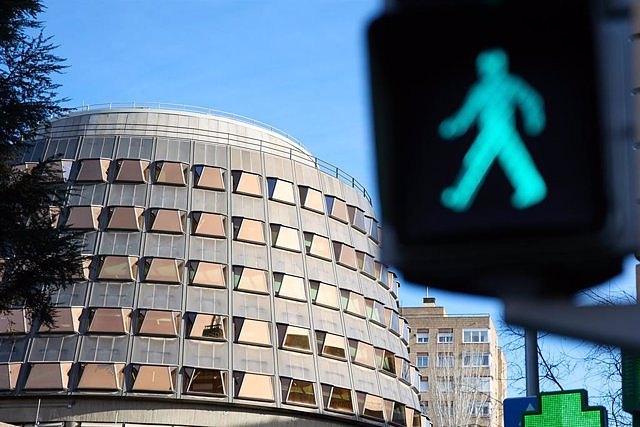It is expected that the new paper will go to plenary session after Easter
MADRID, 8 Mar. (EUROPA PRESS) -
The Constitutional Court (TC) will study how the new abortion law, approved last February, may affect the voluntary interruption of pregnancy law of 2010, to resolve the appeal filed by the PP against the latter, still pending the court guarantees issued a sentence, although the progressive majority already endorsed the norm by rejecting a paper that questioned the constitutionality of some articles.
According to legal sources consulted by Europa Press, the new paper will analyze the impact of organic law 1/2023 --of February 28-- on 2/2010, which modifies, but without delving into a review of the latest regulation, given which is not the one challenged by the PP.
The sources indicate that this is a necessary study because the Constitutional Court is facing a complex situation, in which it must rule on the constitutionality of a law that has already been modified by another.
It should be remembered that the abortion law promoted by the Government of José Luis Rodríguez Zapatero led to the implementation in Spain of the system of deadlines that governs the European environment.
It also eliminated parental consent in cases of abortions for minors under 16 and 17 years of age, but that article was repealed in 2015 by the Executive of Mariano Rajoy, with which the 'popular' resource would have lost its purpose at this point.
However, from the TC a possible conflict is seen on this very matter, since the new abortion law allows minors of that age to abort without the need for parental consent.
Last month, the new progressive majority (7 magistrates compared to 4) rejected the paper written by Enrique Arnaldo, which proposed supporting practically the entire 2010 law, except for article 17, considering that the way of informing women -- via a sealed envelope--does not sufficiently guarantee that you give informed consent to the voluntary termination of pregnancy.
After that, Arnaldo declined to write a new paper that reflects the majority sentiment, so the president of the TC, Cándido Conde-Pumpido, entrusted this task to the vice president of the Constitutional Court, Inmaculada Montalbán.
It is expected that the proposal drafted by Montalbán includes a gender perspective that focuses on the well-being of women, based on the right to decide on their maternity, which will mean a novel approach compared to the paper prepared by Arnaldo, which revolved around the rights of the unborn or 'nasciturus', according to the aforementioned sources.
Initially, the new draft of the ruling on the abortion law was scheduled to be released in March, but sources suggest that it will most likely go to plenary session after Easter.

 Exploring Cardano: Inner Workings and Advantages of this Cryptocurrency
Exploring Cardano: Inner Workings and Advantages of this Cryptocurrency Seville.- Economy.- Innova.- STSA inaugurates its new painting and sealing hangar in San Pablo, for 18 million
Seville.- Economy.- Innova.- STSA inaugurates its new painting and sealing hangar in San Pablo, for 18 million Innova.- More than 300 volunteers join the Andalucía Compromiso Digital network in one month to facilitate access to ICT
Innova.- More than 300 volunteers join the Andalucía Compromiso Digital network in one month to facilitate access to ICT Innova.-AMP.- Ayesa acquires 51% of Sadiel, which will create new technological engineering products and expand markets
Innova.-AMP.- Ayesa acquires 51% of Sadiel, which will create new technological engineering products and expand markets This Friday, Repsol submits to its board the payment of a dividend of 0.45 euros per share in January
This Friday, Repsol submits to its board the payment of a dividend of 0.45 euros per share in January The Treasury starts on Tuesday the 'Le Llamamos' plan and care for the elderly in small municipalities for Income
The Treasury starts on Tuesday the 'Le Llamamos' plan and care for the elderly in small municipalities for Income Labor meets tomorrow with social agents to advance the unemployment benefit reform
Labor meets tomorrow with social agents to advance the unemployment benefit reform Khan is re-elected mayor of London and underpins Labor's victory in local elections
Khan is re-elected mayor of London and underpins Labor's victory in local elections How Blockchain in being used to shape the future
How Blockchain in being used to shape the future Not just BTC and ETH: Here Are Some More Interesting Coins Worth Focusing on
Not just BTC and ETH: Here Are Some More Interesting Coins Worth Focusing on A sensor system obtains the fingerprint of essential oils and detects if they have been adulterated
A sensor system obtains the fingerprint of essential oils and detects if they have been adulterated Faraday UPV presents the 'Origin' rocket to exceed 10 km of flight: "It is the beginning of the journey to space"
Faraday UPV presents the 'Origin' rocket to exceed 10 km of flight: "It is the beginning of the journey to space" The Generalitat calls for aid worth 4 million to promote innovation projects in municipalities
The Generalitat calls for aid worth 4 million to promote innovation projects in municipalities UPV students design an app that helps improve the ventilation of homes in the face of high temperatures
UPV students design an app that helps improve the ventilation of homes in the face of high temperatures A million people demonstrate in France against Macron's pension reform
A million people demonstrate in France against Macron's pension reform Russia launches several missiles against "critical infrastructure" in the city of Zaporizhia
Russia launches several missiles against "critical infrastructure" in the city of Zaporizhia A "procession" remembers the dead of the Calabria shipwreck as bodies continue to wash up on the shore
A "procession" remembers the dead of the Calabria shipwreck as bodies continue to wash up on the shore Prison sentences handed down for three prominent Hong Kong pro-democracy activists
Prison sentences handed down for three prominent Hong Kong pro-democracy activists ETH continues to leave trading platforms, Ethereum balance on exchanges lowest in 3 years
ETH continues to leave trading platforms, Ethereum balance on exchanges lowest in 3 years Investors invest $450 million in Consensys, Ethereum incubator now valued at $7 billion
Investors invest $450 million in Consensys, Ethereum incubator now valued at $7 billion Alchemy Integrates Ethereum L2 Product Starknet to Enhance Web3 Scalability at a Price 100x Lower Than L1 Fees
Alchemy Integrates Ethereum L2 Product Starknet to Enhance Web3 Scalability at a Price 100x Lower Than L1 Fees Mining Report: Bitcoin's Electricity Consumption Declines by 25% in Q1 2022
Mining Report: Bitcoin's Electricity Consumption Declines by 25% in Q1 2022 Oil-to-Bitcoin Mining Firm Crusoe Energy Systems Raised $505 Million
Oil-to-Bitcoin Mining Firm Crusoe Energy Systems Raised $505 Million Microbt reveals the latest Bitcoin mining rigs -- Machines produce up to 126 TH/s with custom 5nm chip design
Microbt reveals the latest Bitcoin mining rigs -- Machines produce up to 126 TH/s with custom 5nm chip design Bitcoin's Mining Difficulty Hits a Lifetime High, With More Than 90% of BTC Supply Issued
Bitcoin's Mining Difficulty Hits a Lifetime High, With More Than 90% of BTC Supply Issued The Biggest Movers are Near, EOS, and RUNE during Friday's Selloff
The Biggest Movers are Near, EOS, and RUNE during Friday's Selloff Global Markets Spooked by a Hawkish Fed and Covid, Stocks and Crypto Gain After Musk Buys Twitter
Global Markets Spooked by a Hawkish Fed and Covid, Stocks and Crypto Gain After Musk Buys Twitter Bitso to offset carbon emissions from the Trading Platform's ERC20, ETH, and BTC Transactions
Bitso to offset carbon emissions from the Trading Platform's ERC20, ETH, and BTC Transactions Draftkings Announces 2022 College Hoops NFT Selection for March Madness
Draftkings Announces 2022 College Hoops NFT Selection for March Madness
























